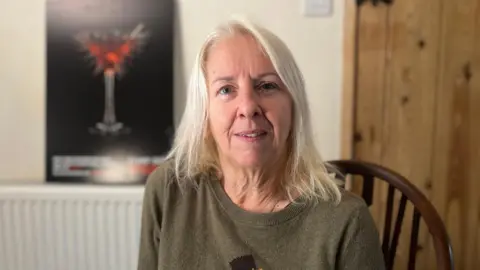'Stay vigilant' warning as spiking reports drop 7%
 BBC
BBCCharity Stamp Out Spiking said it had not seen a fall in suspected incidents, despite a reduction in the number being officially recorded.
New figures from Devon and Cornwall Police show 160 reports of spiking in the year to July 2024, down 7% on the same period in the previous year.
The force said the fall was "largely down to... preventative work" which it carried out with partners.
Dawn Dines, chief executive of the Exeter-based charity, said the prevalence of reports being made to her charity had remained consistent and people should continue to be vigilant.
Devon and Cornwall Police recorded 173 spiking reports in the year to July 2023, and 519 the year to July 2022.
Of the 160 reported spiking incidents in the year to July 2024, 110 resulted in a test being conducted and 14 of those (9%) were positive.
'Be aware'
The force said the proportion of all spiking reports which resulted in a positive test had remained consistent at about 4%.
This compared to a national figure of 5.5% of spiking reports resulting in a positive test.
Insp Martin Tregaskes, drug and alcohol harm reduction lead, said: "People have every right to expect to be able to go out and enjoy their evenings across our region.
"While it is important to be aware of your environment and look out for each other, thanks to our work with partners, there is good awareness of the potential issue of spiking in the evening and night-time economy.
"Having said that, if you think you may have been spiked, tell staff, security or a trusted friend immediately and report it to the police… whenever and whatever has happened.
"Any form of spiking is illegal and the consequences for anyone found to have spiked another person in any way can be severe, including long custodial sentences.
"Further crimes committed against a spiked person carry their own penalties."
'Testing too late'
Mrs Dines said she welcomed the decline in reports of spiking incidents, but said it was not consistent with the number of reports being received by her charity.
"We've had a problem in Plymouth recently, but we've also had reports in Exeter, Falmouth and on Dartmoor," she said.
Mrs Dines said the reason for a low proportion of suspected cases resulting in confirmed cases was that as a society we were "not taking samples in time".
"If this crime happens, please make sure that you ring the police, make sure you report to the NHS, so we can gain those all important samples that are needed to start gaining convictions."
Follow BBC Cornwall on X, Facebook and Instagram. Follow BBC Devon on X, Facebook and Instagram. Send your story ideas to [email protected].
